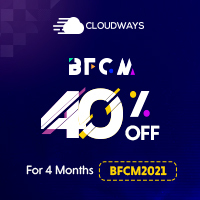
Disclaimer: Magenticians does not necessarily agree with the views expressed in this guest post. They are presented to bring to light all diverse views in the Magento and general ecommerce community.
So you have just build a compelling ecommerce website and traffic has been the all-time high. The problem is that all nice traffic you are seeing isn’t translating into sales. In other words, the visitors don’t trust you enough at the moment to purchase from you.
This is a common issue with many startups and ecommerce stores. Unfortunately, it may be the difference between you being in business tomorrow or not. Long story short, you need to build trust with your customers but this is obviously easier said than done. Luckily, we have compiled some simple ways of building trust on your website without investing so much in ads and digital PR strategies.
Work On Security
Most users these days are aware that buying products or services online is not as safe as the stores want the visitors to believe.It means they are naturally skeptical at conducting transactions on your site.
So, the first place to start would be to work to ensure that you secure your website and show your customers that they are in a safe territory. You can buy EV SSL certificate to protect ecommerce website with 256-bit SSL encrypted connection. EV SSL certificate allows you to enable HTTPS secure protocol at the website and displays visible trust indicators such Company name display and a green padlock icon in browser’s address bar.
An SSL (Secure Socket Layer) certificate encrypts all communication between the customer’s browser and ecommerce website server. If you have multiple domains, a multi-domain EV SSL certificate is the best choice. You can secure both the root domain and unlimited sub-domains with a single Wildcard SSL certificate, which you can obtain from Cheap Wildcard SSL certificate providers to save time and money.
It’s not enough to install an SSL certificate. You should also integrate a secure payment gateway into the store to prevent any data breach that may bring your business to its knees. The easiest option is to work with proven third party payment systems that have a reputation for securing the checkout processes of ecommerce stores. A good example is PayPal, a global leader in handling online payments.
Unfortunately, consumers trust businesses that offer multiple payment options. Thus, you need to offer your customers several options if you can. Of course, this depends on the industry your business belongs to. Some good payment options include credit cards, PayPal, Pay with Amazon, PaySimple, 2Checkout etc. Just remember though that you ought to secure every transaction that comes your way.
User Trust Badges
This brings us to the next point, “boasting” a bit about how secure or just how good you are. Wondering how you can do this?
The secret is in displaying trust badges that act as visual cues to earn trust from the customers. The idea is to ensure that some of the trust of the badge flows down to the visitors.
In fact, research has shown that adding “100% Money Back Guarantee” badge will help increase conversion rates by up to 32%. Other trust seals you can place on the store include SSL badges, Money Back Guarantee Badge, Better Business Bureau badge.
Don’t be tempted to lie, though!
Well Designed Store
If you are looking for a place to eat, you will most likely pick a restaurant that looks good, right?
Well, in the same way, customers tend to picky about who they can trust based on the looks of the store. You thus have to ensure you leave a good and lasting first impression that will encourage customers to move a step further and trust you with their money. I am talking about building a store with a superb user experience where customers could not just navigate around without breaking a sweat but also get the right info about what they are looking for. It is also important to write product descriptions in a way that users can get all the required information about the products on sale.
Display Contact, Support, and Social Information
No one wants to buy from a vendor they can’t contact if they run into an issue and this is why contact and support information should be front-and-center in your store. You ought to give them a number of options to contact your business, whether for pre-sale inquiries or after-sale services. At the minimum, the contact information should include the email address, phone number, social media pages, a link to onsite chatbot and FAQs pages.
Show User Feedback Reviews
A good ecommerce site should also have user feedback (ideally) for all the available products. Neutral Reviews is something all customers want before they can commit to buying from a site. Don’t be scared of getting negative reviews provided you use these reviews as feedback to improve what you are selling and the user experience.
In fact, a bad review among many good ones gives the feeling of authenticity. That said, don’t be tempted to “rewrite” bad reviews as customers are smart enough to detect these fudges reviews.
Create An About Page
An important way of adding the “human touch” is the About Us page that sells the personality of your store. Most businesses go wrong here and describe the company without adding the human factor. Now, you could go a step further and add a message from the founder(s) or perhaps even talk about the team. You could also add photos of your team that increase the trust of the visitors.
In a nutshell, improving the way your customers perceive your website will take time but it is definitely something you should put in a lot of efforts. Once you have done your homework, you are bound to start reaping the benefits with improved conversion rates and profits on your side.
Author Bio
Dan Radak is a web hosting security professional with ten years of experience. He is also a coauthor on several technology websites.

